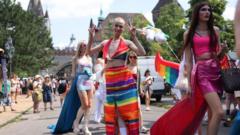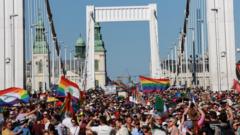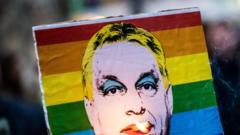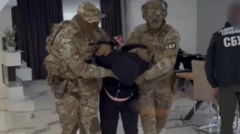**Budapest's annual Pride celebration hangs in the balance as authorities clash over rights to assembly, raising tensions within the LGBTQ community.**
**Budapest Mayor Defies Police Ban on Pride March, Plans "Day of Freedom"**

**Budapest Mayor Defies Police Ban on Pride March, Plans "Day of Freedom"**
**In a bold stand against governmental restrictions, Budapest’s mayor pledges to proceed with a local Pride event on June 28 despite police opposition.**
The Budapest Pride march, an emblem of the LGBTQ community's rights, faces a crucial standoff as city police announce a ban on the event later this month. In a compelling response, Mayor Gergely Karacsony declared, "Budapest city hall will organise the Budapest Pride march as a local event on 28 June, Period." This bold move reflects a growing confrontation between Prime Minister Viktor Orban's nationalist Fidesz government and the city's progressive leadership.
The roots of this conflict lie in the government's ongoing efforts to curtail LGBTQ events, intensified by a recent law restricting assembly in connection with the controversial 2021 Child Protection Law. This legislation allows authorities to prevent gatherings that allegedly expose minors to themes of homosexuality. Karacsony countered police claims, asserting the right to host a "Day of Freedom" as a legitimate local festivity, free from government interference.
On June 16, the mayor publicly supported the event alongside Mate Hegedus, Budapest Pride's spokesperson, outlining plans for a day filled with community unity without explicit LGBTQ themes. "There will be no trucks, no dancers," he clarified in a message directed to local law enforcement. Yet, tensions mount as police warn that underage attendees could witness activities inappropriate for children, underscoring the government's stringent stance.
While thousands of participants are expected to rally for LGBTQ rights on June 28, the Budapest Pride coalition and human rights advocates are urging supporters to resist potential on-the-spot fines, suggesting recourse through appeals. The move to obfuscate the true nature of Pride events adds another layer of complexity to a struggle increasingly scrutinized by legal systems and the public alike.
As the situation unfolds, the resilience of Budapest's LGBTQ community remains palpable amidst a landscape dominated by legal hurdles and political posturing. The battle for equality and expression in Hungary sees no straightforward resolution as the day of the march approaches.


















